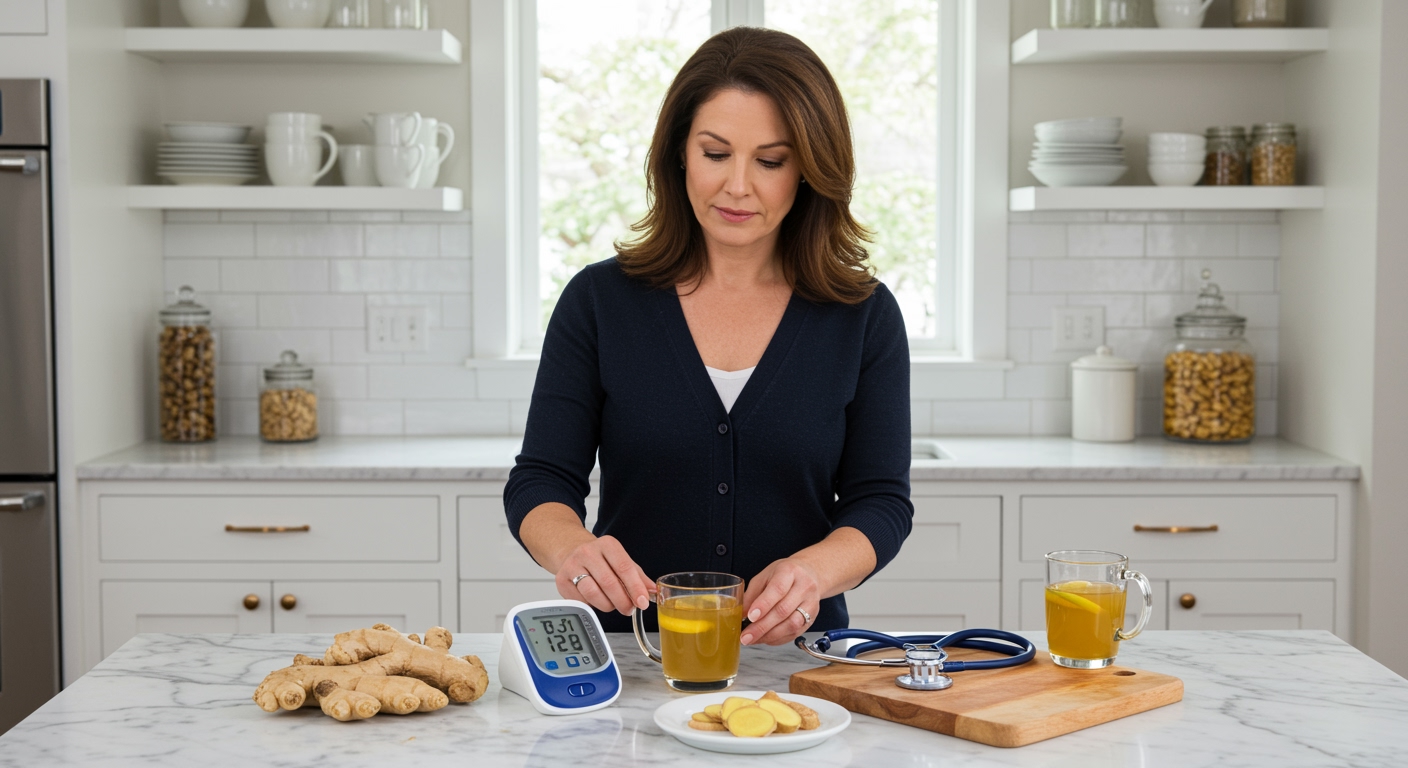✪ Key Takeaway: Ginger can lower blood pressure, which may worsen hypotension symptoms and require careful monitoring.
Introduction
Your morning ginger tea might be doing more than settling your stomach.
Many people with low blood pressure wonder if this popular spice could make their condition worse or somehow help balance their numbers.
Hi, I’m Abdur, your nutrition coach and today I’m going to explain exactly how ginger affects low blood pressure and what you need to know before making it part of your daily routine.
How Does Ginger Actually Affect Blood Pressure?
Ginger contains powerful bioactive compounds called gingerols and shogaols that directly impact your cardiovascular system.
These compounds work as natural calcium channel blockers, which means they prevent calcium from entering the smooth muscle cells in your blood vessel walls.
When calcium cannot enter these cells, your blood vessels relax and widen, leading to reduced pressure against your artery walls.
Research shows that ginger also stimulates the production of nitric oxide, a molecule that signals your blood vessels to dilate further.
This dual mechanism makes ginger particularly effective at lowering blood pressure in people who already have normal or elevated readings.
✪ Fact: Just 3 grams of ginger daily can reduce systolic blood pressure by up to 10 mmHg in some individuals.
What Happens When You Have Low Blood Pressure?
Low blood pressure, or hypotension, occurs when your blood pressure readings consistently fall below 90/60 mmHg.
Your body needs adequate pressure to pump blood effectively to all your organs, especially your brain and kidneys.
When pressure drops too low, you might experience dizziness, fatigue, nausea, or even fainting spells because your brain is not getting enough oxygen-rich blood.
Some people naturally have low blood pressure without symptoms, but others struggle with orthostatic hypotension, where pressure drops suddenly when standing up.
Your kidneys also suffer when blood pressure is too low because they need sufficient pressure to filter waste products from your blood effectively.
✪ Note: Blood pressure below 90/60 mmHg is considered hypotension and may require medical attention if symptoms occur.
Can Ginger Make Low Blood Pressure Worse?
Yes, ginger can potentially make low blood pressure worse because of its blood pressure-lowering effects.
If your blood pressure is already below normal ranges, adding ginger to your diet might push it even lower and worsen your symptoms.
The calcium channel blocking action of ginger does not discriminate between high and low blood pressure situations.
This means the same mechanism that helps people with hypertension could cause problems for those with hypotension.
Studies show that people taking blood pressure medications should be especially careful with ginger because it can amplify the effects of these drugs.
However, the response varies significantly between individuals, and some people with mild hypotension might not notice any negative effects from moderate ginger consumption.
✪ Pro Tip: Monitor your blood pressure closely for two weeks after introducing ginger to detect any significant changes.
Are There Any Benefits of Ginger for Hypotension?
Surprisingly, ginger might offer some indirect benefits for people with low blood pressure despite its pressure-lowering effects.
Ginger improves circulation and blood flow throughout your body, which can help reduce some symptoms associated with poor circulation in hypotensive individuals.
The warming properties of ginger can also help combat the cold hands and feet that many people with low blood pressure experience.
Additionally, ginger supports digestive health, which is important because poor digestion can contribute to nutrient deficiencies that worsen hypotension symptoms.
Some research suggests that ginger might help stabilize blood sugar levels, preventing the blood pressure drops that can occur after meals in people with postprandial hypotension.
However, these potential benefits do not outweigh the risk of further lowering already low blood pressure in most cases.
✪ Fact: Ginger can improve peripheral circulation by up to 25% within 30 minutes of consumption.
How Much Ginger Is Safe With Low Blood Pressure?
The safe amount of ginger for people with low blood pressure depends on the severity of their condition and individual tolerance.
Most nutrition experts recommend starting with very small amounts, such as half a teaspoon of fresh grated ginger or a small piece in cooking.
You should avoid ginger supplements entirely if you have symptomatic hypotension because they contain concentrated amounts that could cause dangerous blood pressure drops.
Fresh ginger used occasionally in cooking is generally safer than daily consumption of ginger tea or large therapeutic doses.
If you experience increased dizziness, fatigue, or fainting after consuming ginger, you should stop using it immediately and consult your healthcare provider.
People taking medications for low blood pressure should never add ginger to their routine without medical supervision due to potential drug interactions.
✪ Pro Tip: Keep a blood pressure log when testing ginger tolerance to track any patterns or concerning changes.
The Bottom Line
Ginger can indeed make low blood pressure worse due to its natural ability to relax blood vessels and reduce pressure.
When dealing with health conditions, convenience should never trump caution, and this applies especially to using herbs like ginger when you have hypotension.
I would love to hear about your experiences with ginger and blood pressure in the comments below, and please share any questions you might have about managing low blood pressure naturally.
References
At NutritionCrown, we use quality and credible sources to ensure our content is accurate and trustworthy. Below are the sources referenced in creating this article:





